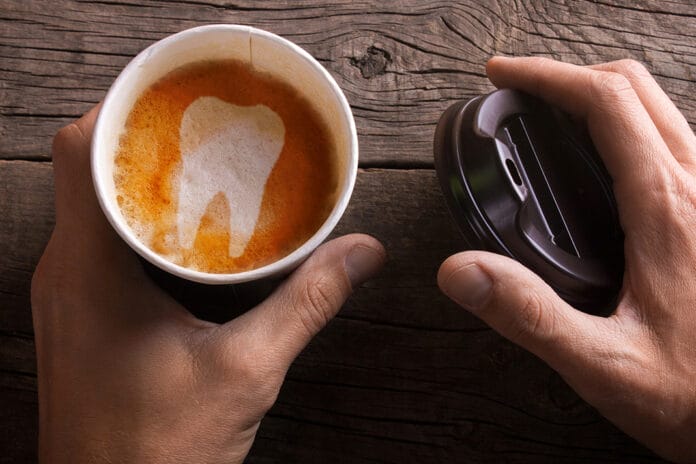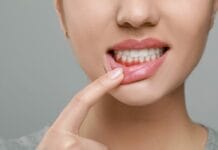The Standard of care in dental offices includes taking a patient’s blood pressure. This is almost step one in the dental visit following a thorough medical history surveillance. When a dental patient’s blood pressure is noted as “high” by the clinician, the patient may reply with a variety of answers about why.
Dental patients are often uneducated about what constitutes high blood pressure or the stages of hypertension. A patient may say it is elevated due to:
- “I have white coat syndrome.”
- “My doctor knows, and he is watching it.”
- “Oh, I just finished my espresso.”
I don’t remember from my education that whatever java they recently consumed was a regular “reason” someone’s blood pressure was high. I had thought it increased heart rate but not necessarily blood pressure. What I wanted to dig into was: Does coffee, in fact, elevate blood pressure and how significantly? It seems to be coffee consumption has increased; whether it is a Starbucks or a locally-owned shop, you can find your fix on every corner, even in the most rural of areas.
There is no getting around the consumption.
According to the National Coffee Data Trends Report, I found that, in 2019, 64% of American’s aged 18 and over drank coffee every day.1 Motley Fool in 2017 pulled together a coffee statistic list that solidified the United States’ love affair with coffee: “Approximately 150 million Americans drink 400 million cups of coffee per day ‒ or more than 140 billion cups per year.”2 That makes us the leading consumer of coffee in the world.
Rest assured, the extrinsic coffee stain encountered by dental hygienists is here to stay. During a recent conversation with a friend, I remembered that, when I was a kid, coffee was an adult-only beverage, just like alcohol. Parents now whip into drive-throughs on the way to school in the morning, buying libations for the entire crew.
Coffee and Elevated Blood Pressure
Coffee is a vasoconstrictor. It produces this vasoconstriction by antagonizing adenosine receptors. What is an adenosine receptor? Why, of course, a receptor for the neurotransmitter adenosine. Adenosine is a chemical that is in all human cells and helps relax and dilate blood vessels.
The transmission of adenosine is important to our bodily functions. For example, it acts to defend neurons against oxidative stress and increases the amount of blood flow to cardiac muscles. Caffeine can reduce cerebral blood flow with the constriction of an average of 27%.3
The initial effect will be a contraction of your vessels but, as your tolerance increases, the overall effect will open the vessels.
Most researchers agree that no long-term damage occurs because the results are temporary. In people with hypertension, caffeine intake produces an acute increase in blood pressure for about three hours, but the evidence doesn’t support an association between longer-term coffee consumption and increased pressure.4
However, Dr. Mikhail Varshavski has had patients stop their caffeine intake completely and found a reduction in blood pressure. If you already have high blood pressure, there will be more of a rise compared to a person who doesn’t have hypertension. The rise in the blood pressure from coffee is not responsive to blood pressure medications. If you take your medicine in the morning and then drink the java, the elevation will still be there.
Think about this too. Many people don’t just stop at one cup. They end up doing a few top-ups throughout the day that, in fact, may lead to sustained high blood pressure.
Caffeine may cause a short but dramatic increase in your patient’s pressure even without having an elevated pressure problem. Interesting is that it isn’t clear as to why. Vasoconstriction is one idea, but the theories run the gamut. Caffeine could block a hormone that keeps our arteries wide, or our adrenal glands release more adrenaline, which causes the pressure to go up. In a meta-analysis of randomized controlled trials, the results found that, yes, regular caffeine intake increases blood pressure. However, when ingested through coffee, the blood pressure effect of caffeine is small.5 Most coffee drinkers do build a tolerance, and it affects the blood pressure less.
Blood Pressure Refresher
What is high blood pressure? Simply put, it is tension in the arteries. Those arteries are the vessels that carry blood from the pumping heart to all tissues and organs in the body. High blood pressure doesn’t just mean an inordinate emotional tension; however, stress and straining can temporarily increase the pressure. That pressure increase is primarily produced by the contraction of the heart muscle.
The measurement of blood pressure is recorded by two numbers. Systolic is the first and is measured after the heart contracts and is the highest. Diastolic, the second is measured before the heart contracts and is the lowest. Historically, it was thought that rises in diastolic pressure were a more important risk factor than systolic evaluations. But for people 50 years and older, systolic hypertension represents greater risk.6,7
A study in 2017 revealed that healthy people between the ages of 19 to 49 with high systolic blood pressure (over 140) are at greater risk for future artery stiffening linked to an increased risk of stroke as well as possible damage to the kidneys and brain. A blood pressure of 140 or higher but a normal diastolic pressure of around 80 is called isolated systolic hypertension (ISH). No one is spared from the detrimental effects of high systolic blood pressure.8
Isolated systolic hypertension can be caused by a host of other health problems such as anemia, hyperthyroidism, kidney disease, diabetes, and heart valve problems.9
Metabolization of Caffeine
There are genetic differences in the way we metabolize caffeine.10 For some of us, it may take a longer time to offload coffee from our system. If you have hypertension and are a slow metabolizer, you may have a prolonged high blood pressure effect.
How can you test to see if you are a slow or fast metabolizer? Take your blood pressure after consuming the coffee at the 30-minute point, as well as one, two, three, and four hours afterward. You are a slow metabolizer if you have high blood pressure after the measurements at two, three, and four hours. You can also do this in the operatory for the early morning patients—blood pressure checks at the first of the appointment and at the end. A hygiene visit is only an hour, but what about the restorative visit?
A 12-ounce cup of coffee has about 100 mg of caffeine. Espresso varies greatly, ranging from 58mg up to 185mg for a double shot. I have been known to take a triple home in my grande latte.
How long does the caffeine last on average? Caffeine has a half-life of 5.7 hours so, if you consumed 200mg at midday, you would still have 100mg at 5:45.11 Not to get into the weeds, but if you have compromised liver function, your serum half-life could be 168 hours! The CYP1A2 gene is needed by the liver to break down 95% of the caffeine in the body. Other genes can influence how well that gene does its job. A variant of the PDSS2 gene also affects the speed of metabolism, especially at lower levels.12
In pregnancy, there is a boost of the half-life of caffeine up to nine to 11 hours, which may be the reason for the low birth weight of babies with high caffeine consumption.13 Smokers metabolize caffeine much more quickly than nonsmokers and tend to consume more caffeine to reach the desired results.14,15 Keep in mind, there is caffeine in many different products, not just coffee. For example, Lipton tea comes in at 35 to 40mg, 12 ounces of Coca-Cola has 45mg, and Excedrin Migraine contains 65 mg. That may not be a great idea to take right before bed.
I dare not tell anyone to put down their beans, but it helps us understand what that java is doing to a patient’s blood pressure when the information is used as the “reason” for the elevation at their appointment.
Need CE? Click Here to Check Out the Self-Study CE Courses from Today’s RDH!
Listen to the Today’s RDH Dental Hygiene Podcast Below:
References
- National Coffee Association. (2019). Retrieved from https://www.ncausa.org
- Tenebruso, J. (2017, January 23). 11 Coffee Stats that Will Blow You Away. The Motley Fool. Retrieved from https://www.fool.com/investing/2017/01/23/11-coffee-stats-that-will-blow-you-away.aspx
- Addicott, M.A., Yang, L.L., Peiffer, A.M., et al. The Effect of Daily Caffeine Use on Cerebral Blood Flow: How Much Caffeine Can We Tolerate? Human Brain Mapping. 2009; 30(10): 3102–3114. Retrieved from https://doi.org/10.1002/hbm.20732
- Mesas, A.E., Leon-Muñoz, L.M., Rodriguez-Artalejo, F., Lopez-Garcia, E. The Effect of Coffee on Blood Pressure and Cardiovascular Disease in Hypertensive Individuals: A Systematic Review and Meta-analysis. The American Journal of Clinical Nutrition. 2011; 94(4): 1113–1126. Retrieved from https://doi.org/10.3945/ajcn.111.016667
- Noordzij, M., Uiterwaal, C.S.P.M., Arends, L.R., et al. Blood Pressure Response to Chronic Intake of Coffee and Caffeine: A Meta-analysis of Randomized Controlled Trials. Journal of Hypertension. 2005; 23(5): 921-928. Retrieved from https://pubmed.ncbi.nlm.nih.gov/15834273/
- Bavishi, C., Goel, S., Messerli, F.H. Isolated Systolic Hypertension: An Update after SPRINT. The American Journal of Medicine. 2016; 129(12): 1251–1258. Retrieved from https://doi.org/10.1016/j.amjmed.2016.08.032
- Prevention of Stroke by Antihypertensive Drug Treatment in Older Persons with Isolated Systolic Hypertension. Final Results of the Systolic Hypertension in the Elderly Program (SHEP). SHEP Cooperative Research Group. JAMA. 1991; 265(24): 3255–3264. Retrieved from https://pubmed.ncbi.nlm.nih.gov/2046107/
- Yano, Y., Neeland, I.J., Ayers, C. Hemodynamic and Mechanical Properties of the Proximal Aorta in Young and Middle-Aged Adults with Isolated Systolic Hypertension: The Dallas Heart Study. Hypertension. 2017; 70(1): 158–165. Retrieved from https://doi.org/10.1161/HYPERTENSIONAHA.117.09279
- Tan, J.L., Thakur, K. Systolic Hypertension. [Updated 2021 Aug 9]. In: StatPearls [Internet]. Treasure Island (FL): StatPearls Publishing; 2021 Jan. Available from https://www.ncbi.nlm.nih.gov/books/NBK482472
- Renda, G., Zimarino, M., Antonucci, I., et al. Genetic Determinants of Blood Pressure Responses to Caffeine Drinking. The American Journal of Clinical Nutrition. 2012; 95(1): 241–248. Retrieved from https://doi.org/10.3945/ajcn.111.018267
- Statland, B.E., Demas, T.J. Serum Caffeine Half-lives. Healthy Subjects vs. Patients Having Alcoholic Hepatic Disease. American Journal of Clinical Pathology. 1980; 73(3): 390–393. Retrieved from https://doi.org/10.1093/ajcp/73.3.390
- Pirastu, N., Kooyman, M., Robino, A., et. al. Non-additive Genome-wide Association Scan Reveals a New Gene Associated with Habitual Coffee Consumption. Scientific Reports. 2016; 6. Retrieved from https://doi.org/10.1038/srep31590
- Knutti, R., Rothweiler, H., Schlatter, C. The Effect of Pregnancy on the Pharmacokinetics of Caffeine. Archives of Toxicology. 1982; 5: 187–192. Retrieved from https://doi.org/10.1007/978-3-642-68511-8_33
- Brown, C.R., Jacob, P., 3rd, Wilson, M., Benowitz, N.L. Changes in Rate and Pattern of Caffeine Metabolism after Cigarette Abstinence. Clinical Pharmacology and Therapeutics. 1988; 43(5): 488–491. Retrieved from https://doi.org/10.1038/clpt.1988.63
- Swanson, J.A., Lee, J.W., Hopp, J.W., Berk, L.S. The Impact of Caffeine Use on Tobacco Cessation and Withdrawal. Addictive Behaviors. 1997; 22(1): 55–68. Retrieved from https://doi.org/10.1016/s0306-4603(96)00023-8











